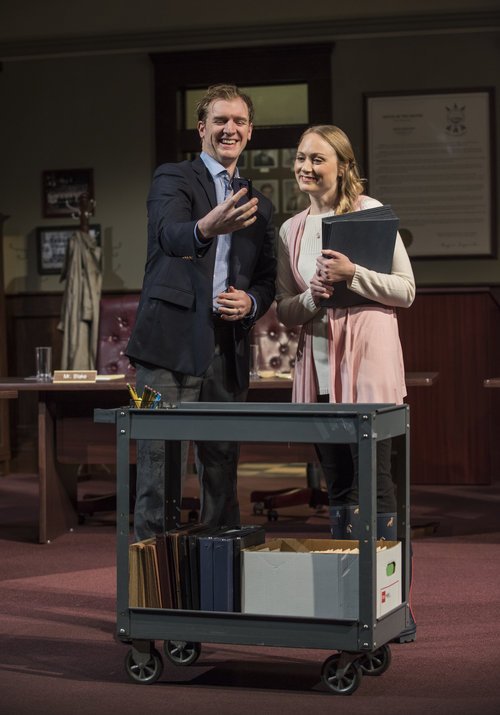The Minutes | Steppenwolf Theatre
3.5 out of 4 stars
(ORIGINALLY PUBLISHED ON CHICAGO STAGE STANDARD)
The Minutes is a palpable examination of the all too familiar topics relevant to today’s political and social climate in America. Pulitzer Prize and Tony Award-winning playwright Tracy Letts writes a scathing new comedy about small-town politics and real-world power exposing the ugliness behind some of our most closely-held American narratives. This play marks the 5th collaboration between Steppenwolf’s Artistic Director, Anna D. Shapiro, and ensemble member, Tracy Letts, and the seventh play by Letts to premiere at Steppenwolf.
Mr. Peel, played by Cliff Chamberlain, is an eager new council member in the fictional town of Big Cherry. Peel missed the last council meeting and this week fellow council member Mr. Carp is now absent. No one will answer Peel’s questions as to where Mr. Carp is. Zealous Mr. Peel repeatedly confronts the council for answers to no avail, as well as politely catches incorrect pronunciations from his fellow council members with the phrase “I don’t think you said that right”. This small detail in the writing suggests the mystery of Mr. Carp’s absence paired with a repetition of incorrectness hints at the fractured nature of the council and suggests something more sinister is at work.
Set in November, The Minutes mirrors themes of present day with the play’s premiere weekend just shy of the fictional timeframe. Letts asks the audience what are the lengths we would go to keep from becoming history’s losers. This topic is nothing short of an exploration of America’s morals and community values, which Letts is no stranger to with his other works, such as Linda Vista and August: Osage County. This performance is full to the brim of social commentary through Letts’ iconic dry satirical humor and quickly paced witty dialogue showcased by the incredible cast. A prime example of well structured writing that leaves undertones and a deeper context to be uncovered through every verbal exchange. With such a collection of colorful characters, the narrative zips from various mental topics thrown amidst lofty bills and council goals. The balance between small town community versus federal level professionalism is blurred through examples of childish personal quarrels and tones of corporate America’s shaming. For example, by asking questions of past events of the council is “taking up too much of our time to catch you up”. The electric surges the play contains are well done with sound design and original music by Andre Pluess, paired with lighting design by Brian MacDevitt. The directional light from the bay windows on the left side of the stage not only mimic the Oval office’s iconic windows, but are utilized in a brilliant way of the flash back sequence adding a golden hue often associated with the turning of time.
The all too close to home topics are robust with the aide of Edward Sobel’s detailed work in his dramaturgy. The historically based aspects of small town monuments housing America’s past and the all too real issues we now face with honoring a now inappropriate historical figure. The idea of comfort over truth arises from this piece and the fundamentals of community are questioned. These themes our America is faced with today. Mayor Superba, played by William Petersen, states “history is a verb”. The work’s four word summary. The consequences of the past affect us today and what we do today will affect us tomorrow. The ever moving wheel continues turning.
The scenic design by David Zinn excels in symbolism complimenting Letts’ compelling piece. While a marching band tune plays and under high arched ceilings, the oak semi circled desks of the Big Cherry council is looked down upon by three seated Greek women with olive branch and medical staff in hands. This choice in depiction of the goddesses being seated is a passive role for women, as well as their faces are looking away or a stoic demeanor eluding to the disappointment happening in the room in front of them. Additionally, these mural females are reflected in the three women of the council out of the eleven members with the power positions being held by three older white men. This very real-world issue is outright addressed in long time council member Mrs. Inness, portrayed by Penny Slusher, making an off the cuff comment about a sexual harassment incident occurring her first years on the council, which shows the lack of weighted concern of these type of issues. Mrs. Inness’ comment is then furthered illustrated later by inconsiderate and chauvinist character Mr. Breeding, played by Kevin Anderson, when he gropes one of the other female characters. Not only are the women silenced in this narrative and struggle for a voice, but also much of the counsel are silenced by what they have to lose allowing the injustice and persecution to reign supreme.
While this play unabashedly questions the morality of our own history. It suggests the need to self-examine in order to move forward honestly and truthfully. Those who are uncomfortable with political commentary may find this hard to watch, but it is an unapologetic statement of where we stand as a national community in the face of our own mistakes and history. Tracey Letts’ work is well worth the watch and a thought provoking piece that is highly relevant to the climate in which we live today.


